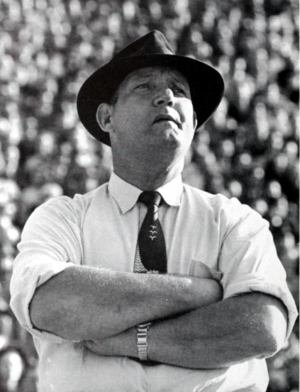Frank Howard (American football) facts for kids

Howard in 1955
|
|
| Biographical details | |
|---|---|
| Born | March 25, 1909 Barlow Bend, Alabama, U.S. |
| Died | January 26, 1996 (aged 86) Clemson, South Carolina, U.S. |
| Playing career | |
| Football | |
| 1928–1930 | Alabama |
| Position(s) | Guard |
| Coaching career (HC unless noted) | |
| Football | |
| 1931–1939 | Clemson (line) |
| 1940–1969 | Clemson |
| Baseball | |
| 1943 | Clemson |
| Track & field | |
| 1931–1939 | Clemson |
| Administrative career (AD unless noted) | |
| 1940–1971 | Clemson |
| Head coaching record | |
| Overall | 165–118–12 (football) 12–3 (baseball) |
| Bowls | 3–3 |
| Accomplishments and honors | |
| Championships | |
As coach:
As player:
|
|
| Awards | |
| 2× ACC Coach of the Year (1958, 1966) | |
| College Football Hall of Fame Inducted in 1989 (profile) |
|
Frank J. Howard (March 25, 1909 – January 26, 1996) was an American college football player and coach. He played college football for Alabama. After a career-ending injury, Howard joined the staff at Clemson College and became head coach in 1940. Howard coached the Clemson Tigers for 30 years, amassing the 15th most wins of any college football coach. He led Clemson to ten bowl games, an undefeated season in 1948, and several top-20 rankings during his tenure as head coach. During his stay at Clemson, Howard also oversaw the athletic department, ticket sales, and was an assistant coach for the baseball team. He was inducted into the College Football Hall of Fame, the South Carolina Sports Hall of Fame, the Alabama Sports Hall of Fame and the Clemson Ring of Honor. The playing surface at Clemson's Memorial Stadium is named after him.
Coaching career
In 1963, after Maryland announced that African-American wide receiver Daryyl Hill was to play, Clemson threatened to leave the conference. Howard vowed that his team would not allow any black to play in their stadium, although Hill did end up playing in the scheduled game.
In the early 1960s,however, Howard allegedly showed compassion to the local community including those at segregated African-American school that he could not recruit. One of the football players was future Michigan State University All American and All Pro George Webster. As a junior at Westside High in Anderson, S.C. Webster suffered a knee injury. The injury could have spelled the end of his career, but then-Clemson coach Frank Howard helped Webster. Michigan State teammate Jim Summers of Orangeville, S.C., tells the story.
“Frank Howard made sure that operation at Clemson University’s medical facility,” Summers said. “George was probably the first black person to spend any sustained time on that campus. If it wasn’t for segregation, George probably would have gone to Clemson, Frank treated him so well.” George Webster was drafted 3rd in the 1967 NFL draft after winning two national championships.
Head coaching record
Football
| Year | Team | Overall | Conference | Standing | Bowl/playoffs | Coaches# | AP° | ||
|---|---|---|---|---|---|---|---|---|---|
| Clemson Tigers (Southern Conference) (1940–1951) | |||||||||
| 1940 | Clemson | 6–2–1 | 6–0 | 1st | |||||
| 1941 | Clemson | 7–2 | 5–1 | 3rd | |||||
| 1942 | Clemson | 3–6–1 | 2–3–1 | 9th | |||||
| 1943 | Clemson | 2–6 | 2–3 | T–7th | |||||
| 1944 | Clemson | 4–5 | 3–1 | 3rd | |||||
| 1945 | Clemson | 6–3–1 | 2–1–1 | 4th | |||||
| 1946 | Clemson | 4–5 | 2–3 | T–10th | |||||
| 1947 | Clemson | 4–5 | 1–3 | 12th | |||||
| 1948 | Clemson | 11–0 | 5–0 | 1st | W Gator | 11 | |||
| 1949 | Clemson | 4–4–2 | 2–2 | T–7th | |||||
| 1950 | Clemson | 9–0–1 | 3–0–1 | 2nd | W Orange | 12 | 10 | ||
| 1951 | Clemson | 7–3 | 3–1 | 5th | L Gator | 20 | |||
| Clemson Tigers (Independent) (1952) | |||||||||
| 1952 | Clemson | 2–6–1 | |||||||
| Clemson Tigers (Atlantic Coast Conference) (1953–1969) | |||||||||
| 1953 | Clemson | 3–5–1 | 1–2 | 6th | |||||
| 1954 | Clemson | 5–5 | 1–2 | 5th | |||||
| 1955 | Clemson | 7–3 | 3–1 | 3rd | |||||
| 1956 | Clemson | 7–2–2 | 4–0–1 | 1st | L Orange | 19 | |||
| 1957 | Clemson | 7–3 | 4–3 | T–3rd | 18 | ||||
| 1958 | Clemson | 8–3 | 5–1 | 1st | L Sugar | 13 | 12 | ||
| 1959 | Clemson | 9–2 | 6–1 | 1st | W Bluebonnet | 11 | 11 | ||
| 1960 | Clemson | 6–4 | 4–2 | 4th | |||||
| 1961 | Clemson | 5–5 | 3–3 | T–3rd | |||||
| 1962 | Clemson | 6–4 | 5–1 | 2nd | |||||
| 1963 | Clemson | 5–4–1 | 5–2 | T–3rd | |||||
| 1964 | Clemson | 3–7 | 2–4 | 7th | |||||
| 1965 | Clemson | 5–5 | 4–3 | T–1st | |||||
| 1966 | Clemson | 6–4 | 6–1 | 1st | |||||
| 1967 | Clemson | 6–4 | 6–0 | 1st | |||||
| 1968 | Clemson | 4–5–1 | 4–1–1 | 2nd | |||||
| 1969 | Clemson | 4–6 | 3–3 | T–3rd | |||||
| Clemson: | 165–118–12 | 102–48–5 | |||||||
| Total: | 165–118–12 | ||||||||
| National championship Conference title Conference division title or championship game berth | |||||||||
|
|||||||||

